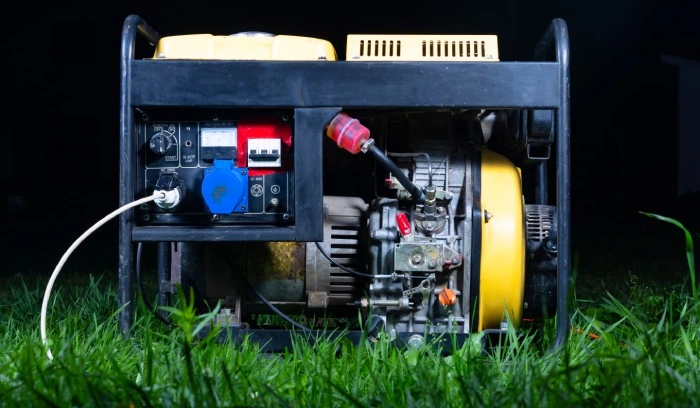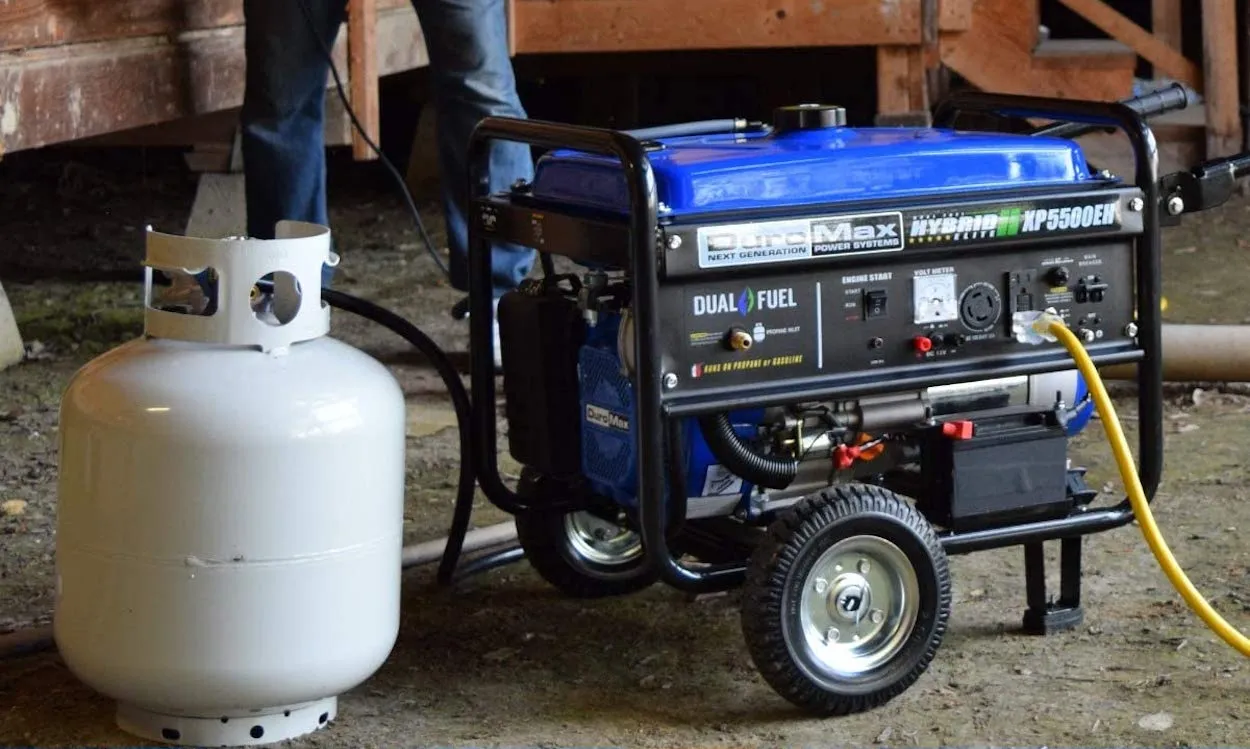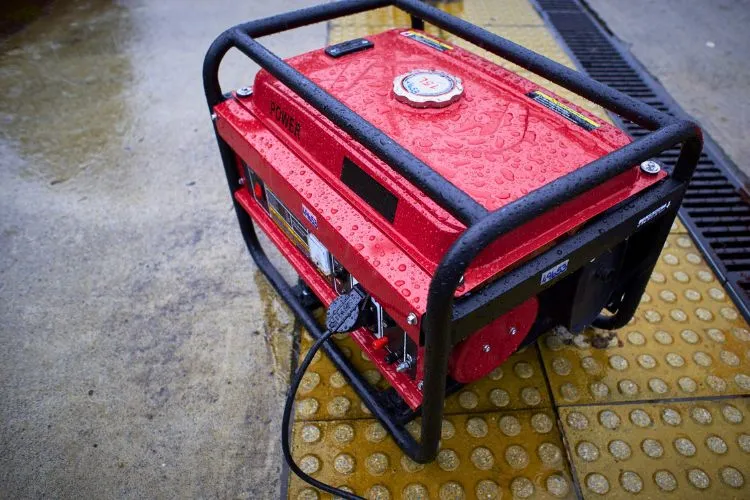Understanding how much gas a generator uses is pivotal for anyone relying on this essential equipment.
Whether it’s for powering your home during an outage, running tools on a job site, or providing electricity while camping, knowing your generator’s fuel consumption can help in planning and managing operating costs.
So, exactly how much gas does a generator use?
This article delves into the various factors affecting a generator’s fuel usage and offers insights into calculating and reducing this consumption efficiently.

Understanding Generator Fuel Consumption
Fuel consumption in generators refers to the amount of fuel used to generate a certain amount of electricity over a specific period.
It’s a crucial factor for users who need to budget for fuel costs, especially during extended periods of use.
Fuel efficiency also affects operational costs and environmental impact, making it an important consideration when choosing and using a generator.
Factors Influencing Fuel Consumption
Several key factors influence how much gas a generator uses. These include the generator’s size and power output, the type of fuel it uses, the electrical load it supports, and its efficiency.

Generator Size and Power Output: Generally, the larger and more powerful the generator, the more fuel it consumes. Larger generators are designed to support more appliances or tools, which means they need more fuel to produce the necessary power.
Type of Fuel: Generators can run on various types of fuel, including gasoline, diesel, propane, and natural gas. Each fuel type has a different energy density, affecting how much fuel is consumed.
For instance, diesel engines are often more fuel-efficient than their gasoline counterparts, but fuel type choice may depend on availability, cost, and personal preference.
Load Size: The amount of electricity you use from the generator (the load) greatly affects its fuel consumption.
Running a generator at full capacity will consume more fuel than operating it at a partial load. Therefore, understanding the power requirements of your appliances and equipment is key to estimating fuel needs accurately.
Generator Efficiency: Technology has greatly improved the fuel efficiency of generators. New models come with features that allow them to adjust the engine speed based on the electrical load, significantly reducing fuel consumption when operating at lower capacities.
How Much Gas Does A Generator Use?
To estimate how much gas your generator will use, start with a basic calculation method.
This involves using the generator’s fuel consumption rate, usually provided in the user manual or manufacturer’s website, which tells you how much fuel the generator uses per hour of operation at a specified load.
Considering the manufacturer’s data gives you a more accurate estimate, but for a practical understanding, nothing beats real-world testing.
Try running your generator under typical conditions to see how quickly it goes through fuel. This method offers insight into how your specific usage patterns affect fuel consumption.
Reducing Your Generator’s Fuel Consumption
Reducing the amount of fuel your generator consumes not only saves money but also minimizes its environmental impact. Regular maintenance is crucial; a well-maintained generator runs more efficiently and uses less fuel.
Checking and changing the oil, air filters, and spark plugs according to the manufacturer’s recommendations can make a significant difference.
Smart load management involves using your generator to power only the most necessary appliances and turning off others when they are not needed.
It helps in significantly reducing the fuel consumed. Upgrading to a more efficient model can also be a wise choice, especially if your current generator is old and less efficient.
Environmental Consideration
The environmental impact of generator fuel consumption extends beyond just the immediate area of use. Burning fossil fuels releases carbon dioxide, a greenhouse gas contributing to global warming.
By understanding and minimizing your generator’s fuel consumption, you contribute to reducing these emissions and protecting the environment.
Choosing the Right Generator for Your Needs
Selecting the right generator is crucial for optimizing fuel efficiency and meeting your specific power needs.
The key lies in matching the generator’s capacity to your energy consumption requirements. Small portable generators are sufficient for occasional recreational use or powering a few household items during an outage.

Conversely, large standby generators are designed for powering an entire home or a significant portion of a business and naturally consume more fuel due to their increased capacity.
The type of fuel you plan to use also plays an integral role. Some fuels, like diesel, burn more efficiently than gasoline, leading to longer runtimes and potentially lower operating costs.
Inverter generators, though often more expensive, adjust their engine speed to match the load, resulting in better fuel economy and reduced noise.
Taking into account the generator’s efficiency rating, load management capabilities, and your average usage can inform a more cost-effective and environmentally friendly choice.
By carefully considering these factors, you not only ensure that you get a generator that fits your usage patterns but also one that maintains optimal fuel consumption, thereby saving you money in the long run and contributing to a smaller carbon footprint.
Frequently Asked Questions (FAQs)
How much gasoline does a generator use per hour?
The amount varies depending on the generator’s size, load, and efficiency. Check the manufacturer’s specifications for precise figures.
Does running a generator on half load significantly reduce fuel consumption?
Yes, operating a generator on a smaller load can reduce fuel consumption since it doesn’t have to work as hard to produce electricity.
How do I calculate the running cost of my generator based on fuel consumption?
Multiply the amount of fuel the generator uses per hour by the cost of the fuel. Then multiply that number by the number of hours you run the generator.
Can I switch fuel types to improve efficiency?
Some generators are designed to run on multiple fuel types. However, efficiency improvements depend on the specific generator and fuel types involved.
How often should I check the fuel consumption rate of my generator?
It’s wise to monitor fuel consumption regularly, especially if you use the generator frequently or for extended periods. This can help identify any changes that might indicate maintenance issues.
Conclusion:
Knowing how much gas a generator uses is essential for efficient and cost-effective operation.
By considering the generator’s size, fuel type, load, and efficiency, you can estimate and manage your fuel needs more accurately.
Regular maintenance, smart load management, and investing in a fuel-efficient model can further reduce your generator’s fuel consumption.
Not only does this save money, but it also lessens the environmental impact, making it a win-win for both you and the planet.
